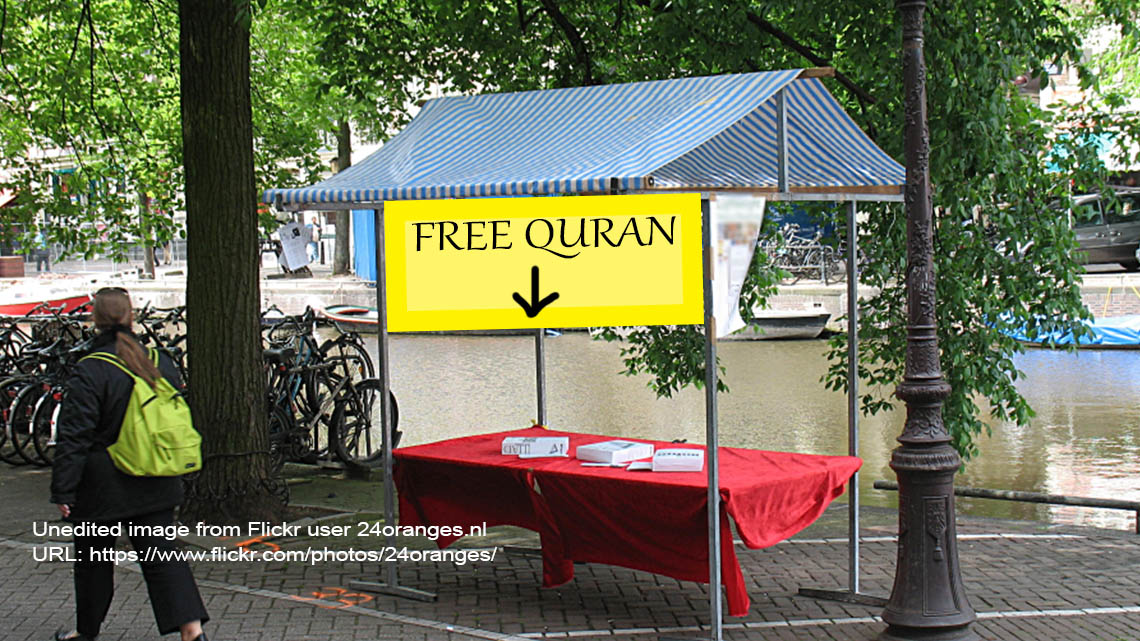Why do 90% of Sedition suspects get let off?

- 213Shares
- Facebook201
- WhatsApp3
As you might be (more than) aware by now, there seems to be an increasing number of people being charged with sedition this year. We asked SUARAM about this and they gave us a list of sedition cases in Malaysia from 2010 to September 2014, which we’ve condensed into a chart for your viewing pleasure:
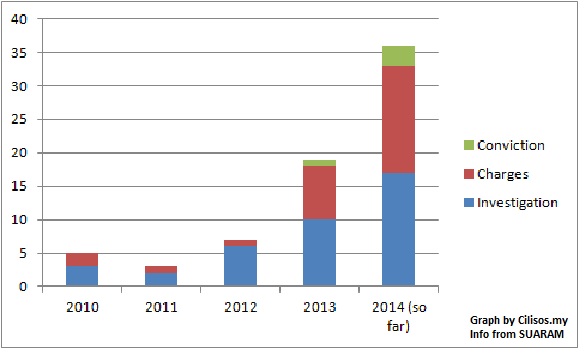
So… guess that confirms it then – The sedition charges in the country are mounting in higher numbers than a cavalry brigade on a full charge.

Yeah, our original joke about “mounting” was rejected, like last Saturday’s date.
Aaaaanyways, back to the main point:
As we’ve mentioned in some of our past articles, the Malaysian Sedition Act has been noted by some as being a little too open to interpretation, with charges being filed based on tendency rather than outcome. With charges being placed on members of the press, educators, students, and even Facebook satire groups, we’re facing rather worrying questions about the future of our educational system and press freedom.

We also came across this little graphic from themalaymail online. Have a look at it:
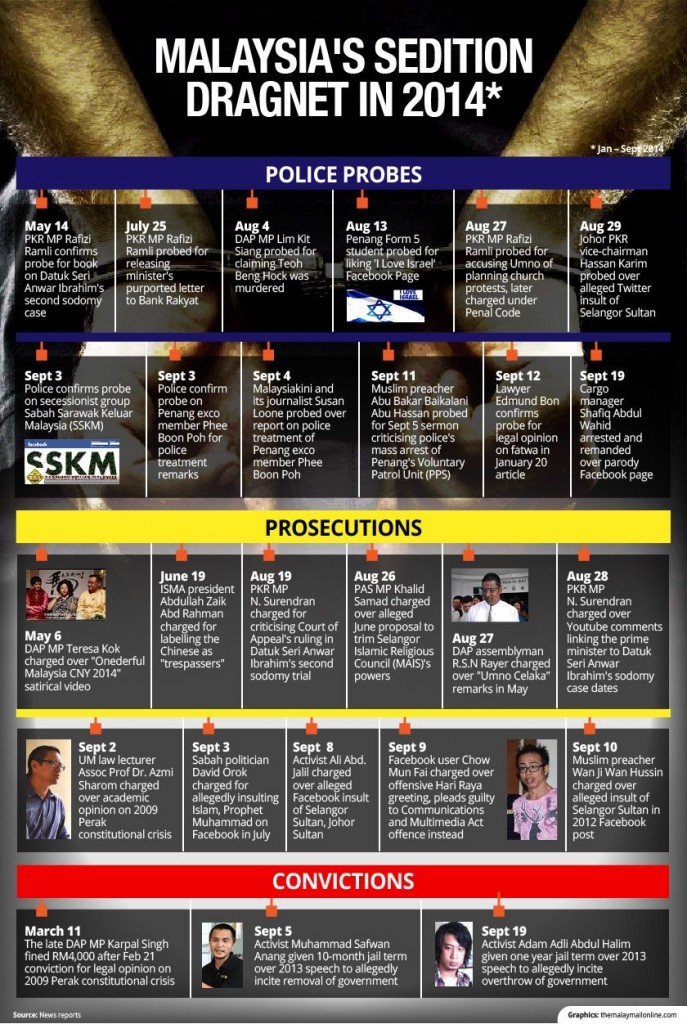
Notice anything? Twelve investigations, 11 prosecutions… aaaandddd 3 convictions? You might be wondering why the number isn’t any higher, and we wondered the same.
Yea yea whatevs. Just tell me what to do if the sedition police come after me.
Oh. Just do what we did. Call a lawyer.
Bongok.
No we’re being serious here. We called a few lawyers to ask them how they would usually approach a case where a client is charged with sedition. We spoke to our favorite ponytailed lawyer Fahri Azzat of Loyarburok; Eric Paulsen, the executive director of Lawyers for Liberty; Michelle Yesudas, legal and campaign coordinator for Lawyers for Liberty; and Yap Swee Seng, the executive director of SUARAM.
Yep. We are trying to make as many legal friends as possible since….
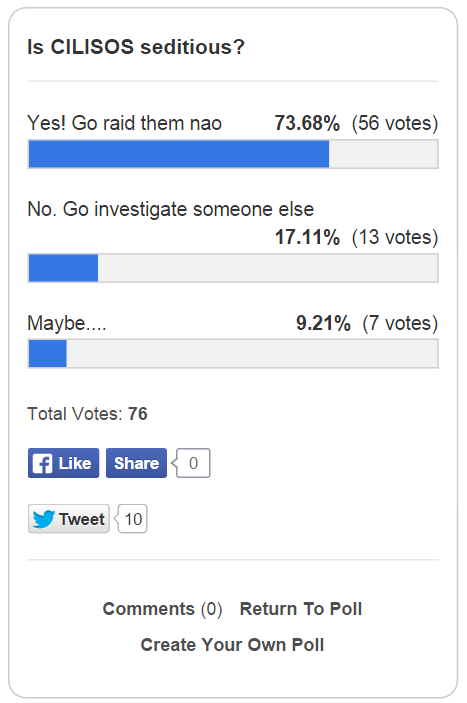
While the people we spoke to mentioned that each case is unique, they did point out 4 common methods used to defend their clients, such as:
1. The “He didn’t say that oso” defense
One of the first things a lawyer tries to prove is whether or not the client actually said those words. Because, y’know, if the client didn’t say it then the client… didn’t say it la. Quite straightforward, right?
Unfortunately, technology.

Because almost everything is on record in a Facebook status update, a random person’s iPhone, or a news article somewhere, the “my client didn’t say it” defense is getting increasingly harder to use. Oh, and deleting it won’t really work either. There’s probably a cached copy of it somewhere.
2. The “It got lost in translation” defense
You know that “Chinese whispers” game? The one where you and a bunch of other people stand in a line and whisper a message to the person behind you only to find how distorted the message got when it reached the end? Yeah. It’s sorta what this form of defense tries to show. Eric Paulsen mentions the sedition investigation against lawyer Edmund Bon as an example, where his comments were stated in English but translated to BM for The Malaysian Insider’s Bahasa Malaysia section.

Eric Paulsen did clarify that this won’t work when something like a speech has been recorded, so for that lawyers can try….
3. The “It’s unconstitutional!” defense
So in case you haven’t read any of our past sedition articles (fo’ shame), the Sedition Act of 1948 was drafted in…. well, 1948. Laws have to be passed through the parliament before they can be approved, and since there was no parliament in 1948 on account of belum Merdeka, it can be argued that it isn’t a constitutional law.

Basically it means that it’s a law left behind by the orang puteh and therefore is not a proper Malaysian law la.
Yap Swee Seng mentioned that this is the form of defense being used in the cases against N. Surendran and and Azmi Sharom; and Michelle Yesudas has also said that this seems to be the best idea right now
“… but if there are any other ones, you should let me know. Haha.”
4. The “I hurt you because I love you” defense
The Sedition Act actually contains some exemptions. Note that we are simplifying the words below, but if you like lawyerspeak here’s a copy. Look for section 3(2).
You are exempt from the Act if you:
- Can show that a Ruler made a mistake
- Point out weaknesses within the Government or it’s laws and policies with the intention of fixing them
- To get people to LEGALLY initiate change
- To point out things that causes non-muhibahness with the intention to get rid of them
Of course the exception to these exceptions is that these exceptions don’t apply when it comes to the Social Contract.

However, Michelle Yesudas has mentioned that proving this either way is difficult.
Eh wait, didn’t you just bocor all their defense options?
Wellllll…. Yeah we guess we did. BUT – and this is a capital BUT here – each case is different and therefore the approaches are specific to the case. Our ponytailed lawyer Fahri sums it up for us (emphasis is ours):
“We would prepare the case no differently than we would any other. First get evidence … [And] then we would research cases to see which arguments have already been taken. Avoid those that have already been argued and lost, i.e. almost all of them“
Haha. Funny guy, that Fahri. Haha.
But in all seriousness though, he’s not wrong. All four people we spoke to agreed that the Sedition Act is quite vague and up to interpretation, which in law shouldn’t be the case.
But your title says 90% of Sedition suspects get let off….
Sorry, that was a bit misleading on our part. To clarify beforehand, an investigation means the authorities are looking into it but has not placed formal charges, a charge is when it’s official and you have to go to court, and a conviction is when you go to jail and do not collect RM200.
Yap tells us that sometimes the investigation might be inconclusive, the charges get dropped, or the person was eventually charged under a different law. There’s also a possibility that a case might be awaiting trial in High Court if it involves the constitution defense. Apparently that takes awhile.
So if I kena sedition what can I do?
You can call SUARAM or Lawyers for Liberty for legal help. Oh, and have some money prepared for bail as well.
But you know what works even better? Prevention. Don’t post anything that can be misinterpreted or be offensive to anyone. Keep your opinions to yourself, even if you have the educational or professional capacity to express them. Don’t try to be funny, because satire is dangerous. And most importantly, don’t question. Heh.
And again, satire is dangerous so it’s a good thing we aren’t Fake Malaysia News. Or associated with them. Or as genius as them.
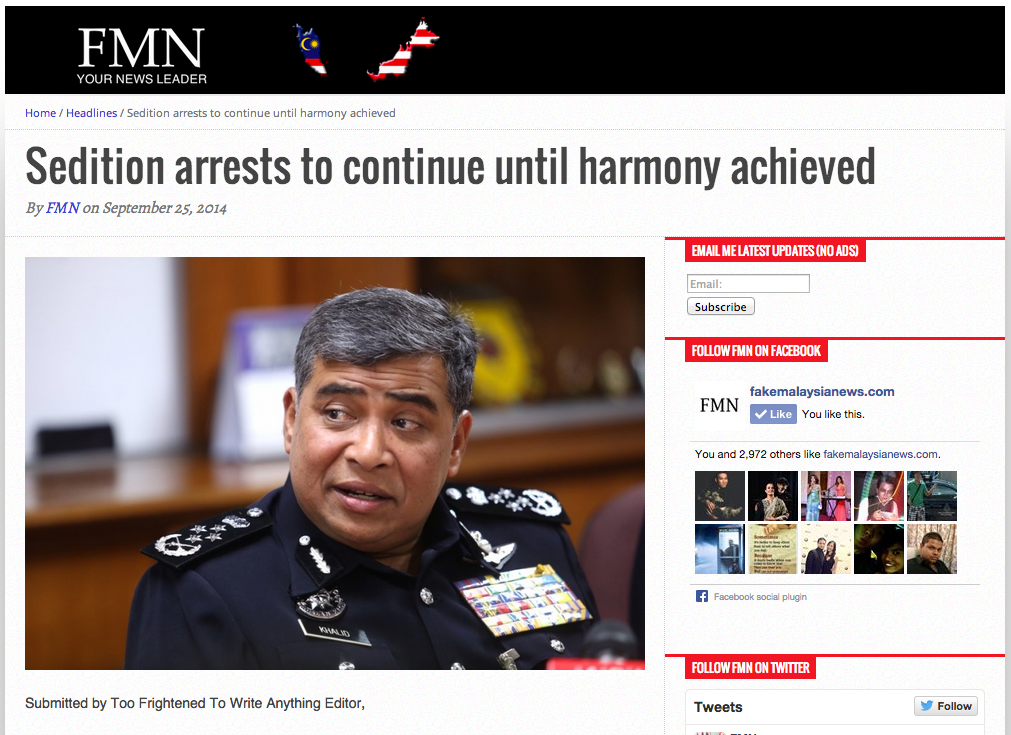
- 213Shares
- Facebook201
- WhatsApp3


